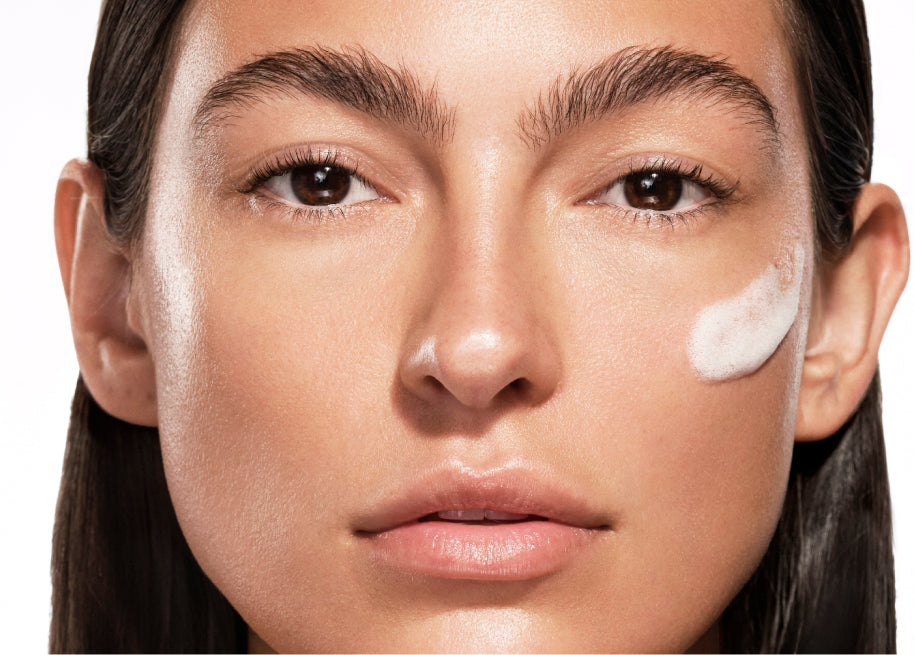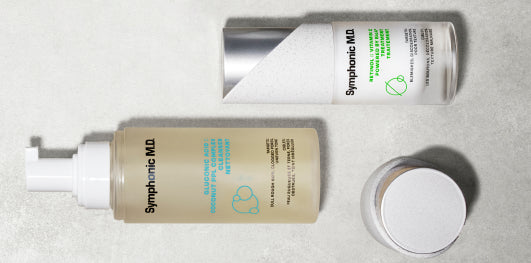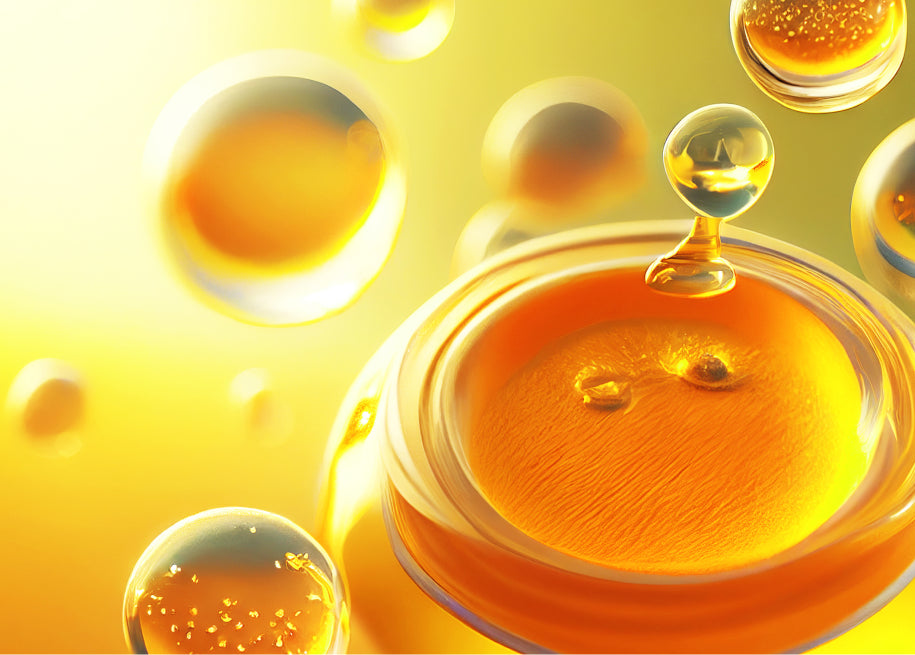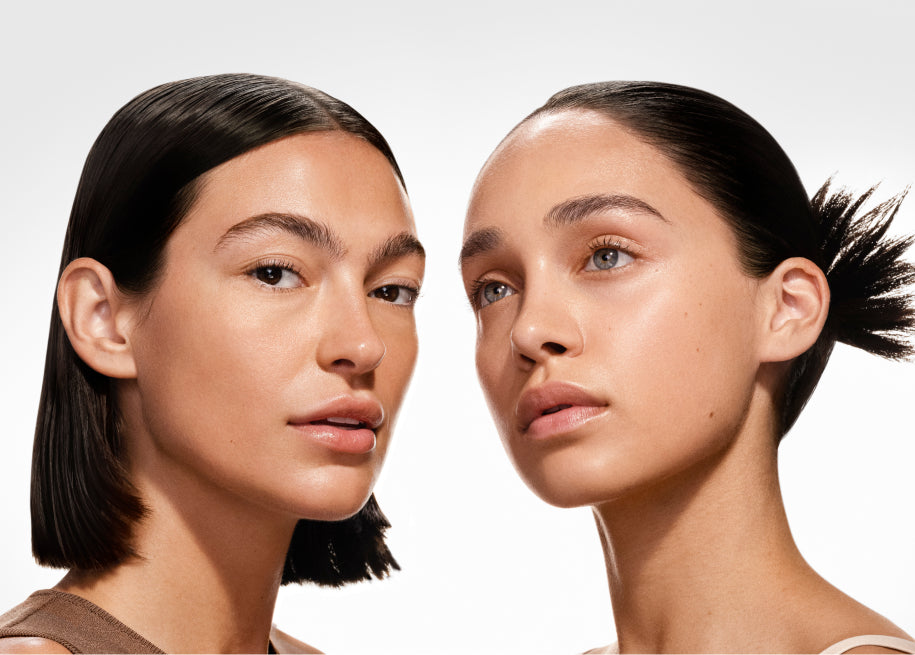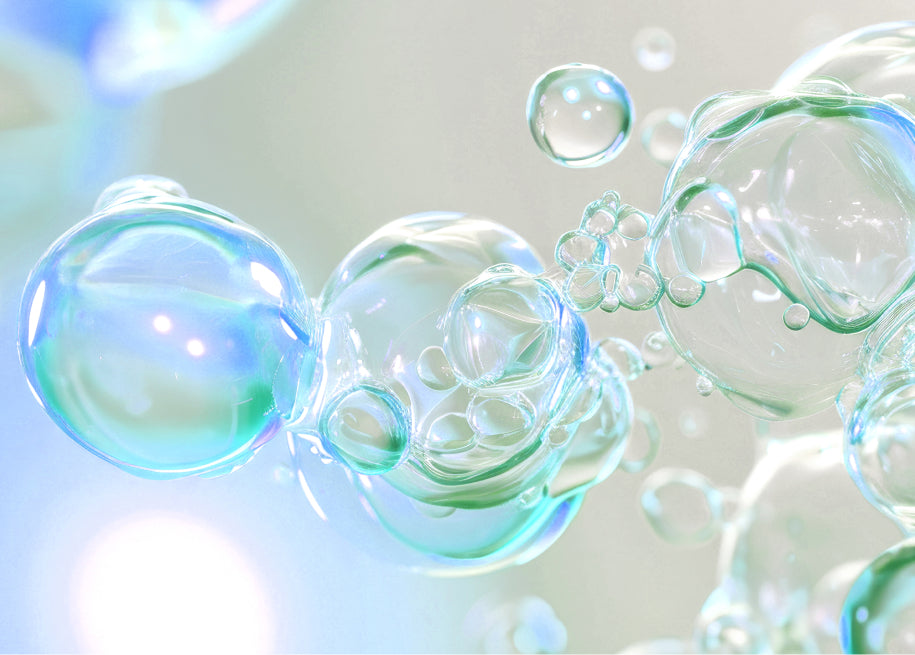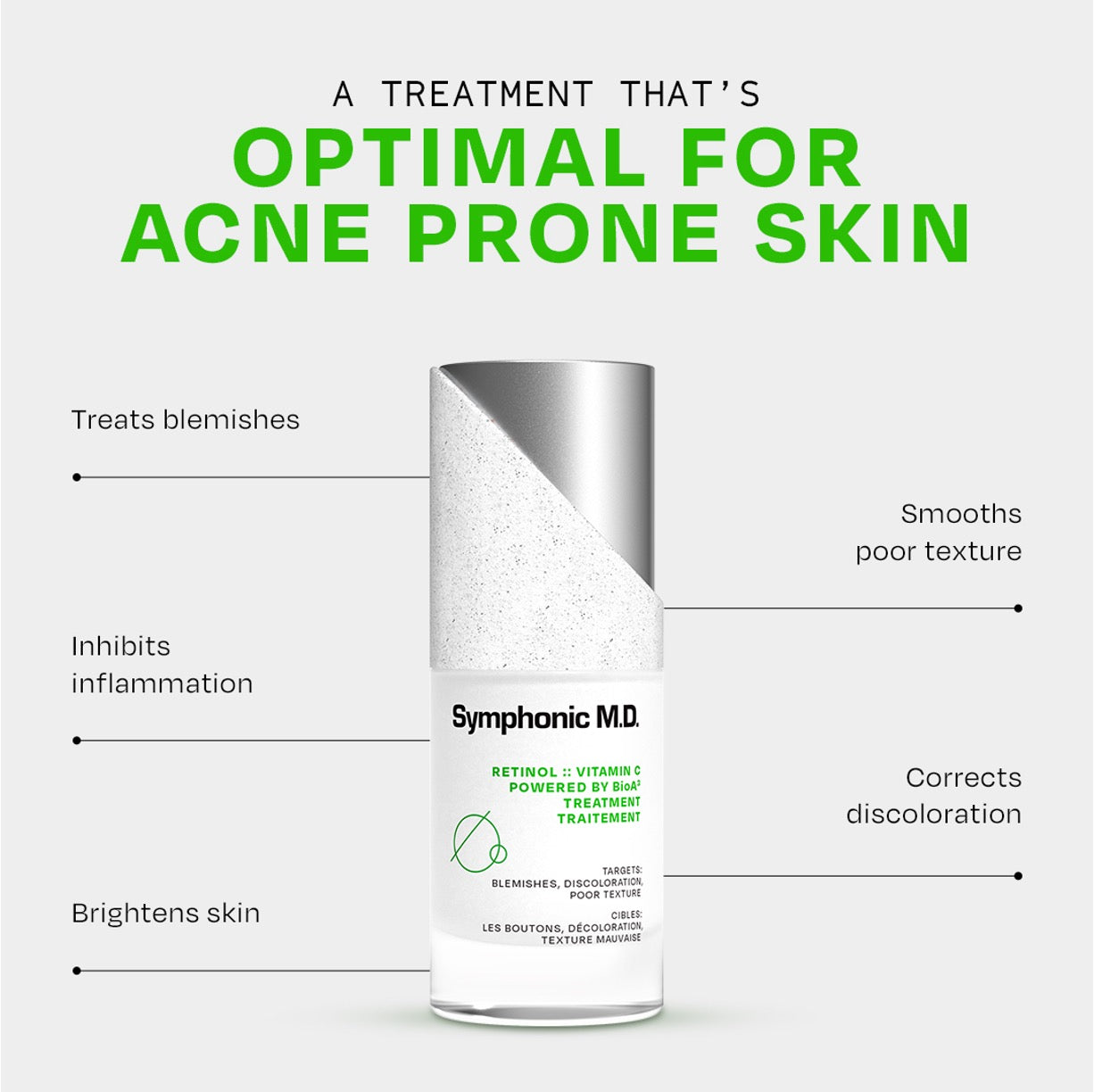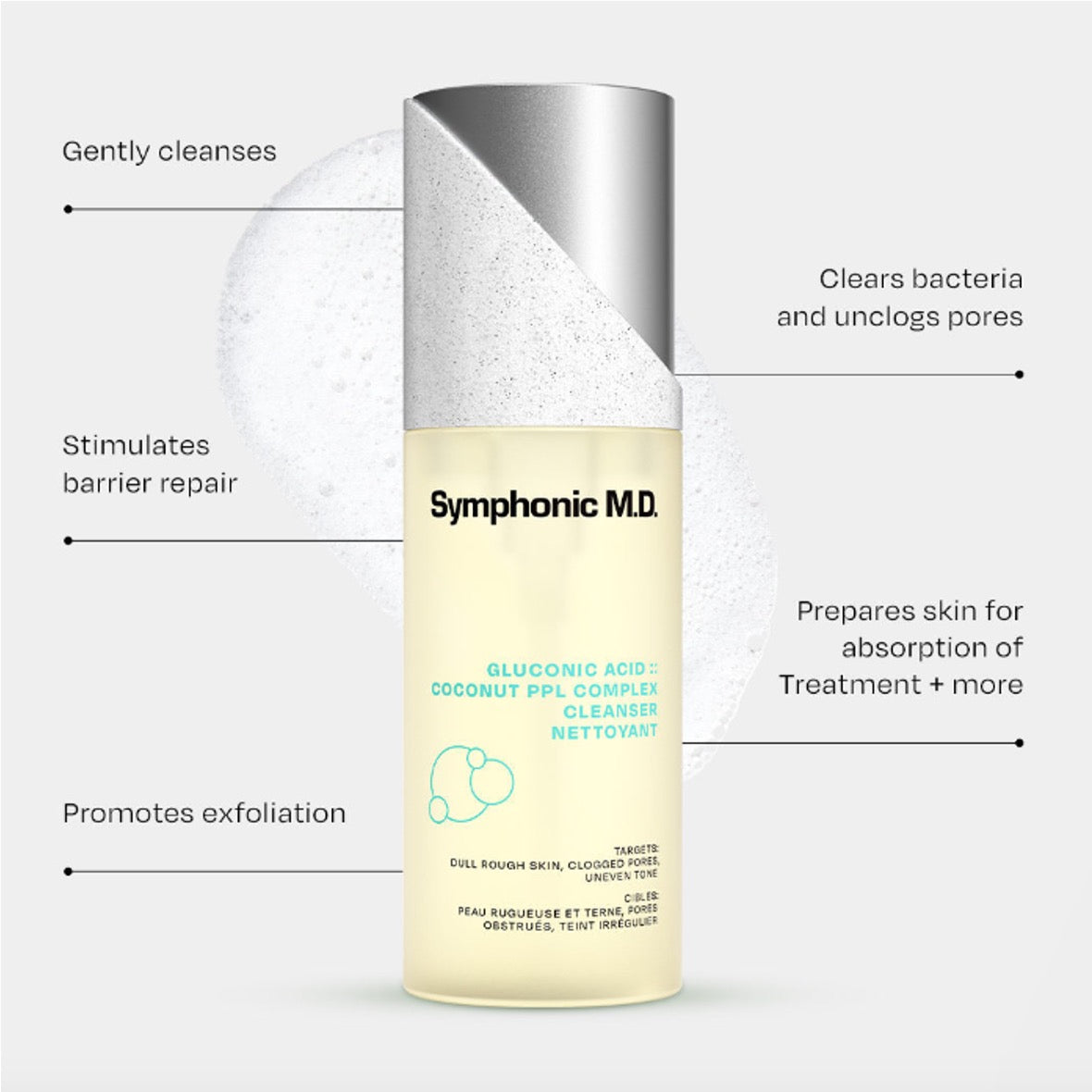Face wash is designed to cleanse the skin and remove dirt, oil, and other impurities - right? So it can be annoying or confusing when you start to experience acne breakouts after using a new face wash. Unfortunately, some face washes and the ingredients within them have the potential to contribute to these breakouts rather than clear them.
Acne breakouts can also be mistaken for purging, which is a process the skin often goes through with new skincare products. We’ll address the differences between skin purging and acne, as well as look at why face washes seemingly cause acne and what you can do about it.
The difference between breakout out and skin purging
When a new skincare product has been introduced to the skin, whether it’s a face wash, cleanser, serum, or moisturizer, the skin can have a few different responses. Two of these responses are skin purging and breakouts. It’s important to understand the differences between these two reactions to establish whether to continue using a product or if it’s causing an adverse reaction.
Skin Purging
Purging is a skin reaction that typically results in breakouts, dryness, flaking, and peeling. The blemishes you see are often similar to those you get with acne breakouts and can include blackheads, whiteheads, and small pimples. As more of us use skincare products with active ingredients that aim to improve the appearance of our skin, purging has become more common.
It would be unlikely for a purging breakout to occur in a previously unaffected area of your face.
Many skincare products contain ingredients such as alpha hydroxy acids (AHAs), beta hydroxy acids (BHAs), or retinoids which exfoliate the skin and increase cell turnover. When cell turnover increases, existing clogged pores can rise to the surface and result in temporary breakouts, known as skin purging.
Skin purging commonly affects areas where your breakouts are usually experienced. It would be unlikely for a purging breakout to occur in a previously unaffected area of your face. As a temporary reaction, you can expect purging to last a few weeks, as your skin gets used to the new product and speeds up its regeneration process.
After the purging period, your skin should visibly improve, signaling that your skin has built up a tolerance to the new products you’re using.
Breaking out
‘Breakouts’ or ‘breaking out’ often refers to acne, which is a skin condition arising when the hair follicles become clogged with oil or dead skin cells. This clogging causes whiteheads, blackheads, and pimples to appear which can become inflamed, infected, or irritated.
While acne can happen due to genetic or lifestyle factors, breakouts are often a negative response to a product you’re using. This could indicate the product is not suitable for your skin. If you’re trying a new product and it contains an ingredient you’re not used to, it could be clogging your pores and causing irritation which results in acne, or it could be triggering an allergic reaction.
You’ll know whether your acne is down to a breakout or purging if you continue to use the product. With continued use, your breakouts will likely persist or worsen if you’re having an adverse reaction, so it would be best to stop using it. If you continue using the product and your skin improves, it’s likely you’re experiencing purging and can keep using the product to reap its benefits.
In contrast to skin purging, acne breakouts can occur anywhere, even in places where you don’t usually experience acne. Breakouts caused by your face wash or ingredients in new skincare products can also look a little different from typical acne. Your breakout might look more red, inflamed, or larger than the regular acne you’ve experienced before.
Breakouts caused by your face wash or ingredients in new skincare products can also look a little different from typical acne. Your breakout might look more red, inflamed, or larger than the regular acne you’ve experienced before.
8 reasons your face wash could be causing acne
There are many reasons why your new face wash could be causing acne breakouts on your skin, aside from purging. Here are some of the most common reasons.
1. Harsh or comedogenic ingredients
If your face wash contains harsh ingredients, such as abrasive or irritating substances, continued use of this product could lead to skin irritation, inflammation, and acne breakouts. Other harsh ingredients that could cause breakouts include chemicals, fragrances, physical exfoliants, and pore-clogging ingredients, also known as comedogenic ingredients.
2. Imbalance in pH
Our skin has a natural pH balance of around 4.7, which is classed as mildly acidic. Some face washes have inappropriate pH levels for the skin, leading to a disruption of the skin’s natural balance. This could result in excessive sebum production or the creation of an environment that fosters bacterial growth, both of which can lead to acne breakouts.
3. Over-washing
While face wash is designed to clean the face, it is possible to use it too much. Washing your face too frequently, either with just water or your face wash, can strip the skin’s natural oils. This results in your skin producing more oil to try and compensate for the dryness it’s feeling, which can lead to clogged pores and acne breakouts.
4. Incompatible with your skin type
Using a face wash designed for your skin type is essential, just as it is with any other skincare product. If you’re using a facial wash that’s designed for oily skin but you have dry skin, you could be using something too harsh. Likewise, if you have oily skin but are using a sensitive skin face wash, the ingredients might not be strong enough for you. Using the wrong product can result in imbalances in your skin, irritation, and acne breakouts.
5. Residue is left behind
When washing your face, you must remove all instances of your face wash. When residue is left on the skin, it can mix with sweat and natural skin oils, increasing the risk of clogged pores and breakouts of acne. Even if you think you’ve removed all the face wash, some products have a much thicker consistency so it’s worth doing an extra rinse.
6. Allergic reactions and sensitivities
Another common reason for acne breakouts due to face wash is the possibility of allergic reaction or sensitivity. If you already have sensitive skin, you might react adversely or be allergic to certain ingredients, even if they are considered safe for general use. If you already know what these ingredients are, you should avoid using products containing them.
If you’re not sure, you’ll only find out by using the product. Continue using it to establish whether your new product is causing a breakout or you’re experiencing skin purging and then make a decision once you know. If it’s not a skin purge, stop using the product immediately and look for a gentler alternative.
7. Abrasive cleansing tools
For those who already experience acne regularly, you might be tempted to use cleansing tools or abrasive products to “scrub” your acne away. However, this will not work. Instead, by using abrasive and harsh cleansing tools or products, you can damage the skin barrier and make acne worse by irritating it. If in doubt, stick to face washes for your skin type, and if you already have acne, ensure you’re using acne-fighting ingredients.
8. Water quality
If you’re experiencing breakouts after starting a new face wash, it might not be the face wash doing the damage. Sometimes our water quality can impact the skin, for example, hard water can leave mineral deposits on the skin which could contribute to acne. While this isn’t technically a fault of the face wash, it’s a factor to consider if your skin is experiencing a breakout.

Face wash ingredients that can cause acne
We’ve already mentioned that certain ingredients in facial washes can cause acne breakouts on the skin. Here, we’ll delve into the most common ingredients that contribute to acne, both in those who already experience acne and those experiencing completely new acne breakouts.
Alcohol
It’s not a secret that alcohol is drying for the skin. Think about how your skin usually feels after a night out drinking, and then consider the impact alcohol being added directly to the skin would have. Facial washes that contain alcohol can be overly drying for the skin and may even strip the skin of its natural oils. This can result in your skin overproducing oil to compensate for the lack of moisture which can, in turn, clog pores and contribute to acne.
Fragrances
Artificial fragrances are typically made with chemicals that can irritate the skin and cause redness, itchy skin, and even hives, particularly in those with already sensitive skin. This irritation can trigger acne breakouts so it’s always best to look for fragrance-free face washes.
Sulfates
Sodium lauryl sulfate (SLS) or sodium laureth sulfate (SLES) are foaming agents often found in face washes. While useful in cleansing the skin, sulfates can be harsh. This means they can strip the skin’s natural oils, leading to increased oil production, clogged pores, and an increased risk of acne.
Comedogenic oils
We mentioned comedogenic products earlier, and some oils commonly found in facial washes, such as palm oil or cocoa butter, can be comedogenic. This means they could potentially clog pores and increase your chance of experiencing acne. It’s a good idea to do some research into different types of comedogenic oils in relation to your skin type to determine which oils should be included or excluded from your skincare regimen.
Artificial colors
Like fragrances, artificial colorants can contain chemicals that irritate and negatively impact the skin resulting in inflammation or acne. Artificial colors should be particularly avoided by those with sensitive or acne-prone skin.
Physical exfoliants
Some facial washes contain physical exfoliants, typically those designed for oily or acne-prone skin. However, these harsh physical exfoliants can cause microtears in the skin or irritate already sensitive skin, resulting in acne breakouts.
Silicones
Face washes with silicone can contribute to clogged pores and acne because some heavy silicones can act as a barrier. This occlusive barrier can trap oil, dirt, and dead skin cells under the skin’s top layer, leading to an increased risk of acne and irritation.
Parabens
Parabens are preservatives often used in skincare products to help them last longer. They are a little controversial because some scientific studies have suggested they have the potential to disrupt hormones and increase the risk of some cancers. However, they can also cause skin irritation and contribute to acne if your skin is sensitive to them.

Lanolin
Derived from sheep’s wool, lanolin is a thick and heavy ingredient often used in skincare products to lock in moisture. However, its consistency also means it could clog pores and result in acne or other skin irritation, especially for those with sensitive or acne-prone skin.
Acne treatments
Sometimes, you’ll come across facial washes that have been specifically designed to help with acne. They may contain ingredients such as benzoyl peroxide or salicylic acid. However, while these products contain ingredients typically used to treat acne, they could have the opposite effect on individuals sensitive to these ingredients in higher concentrations.
Struggling with acne and worried a moisturizer might aggravate it? Uncover the truth about moisturizers and acne in our detailed guide Does Moisturizer Cause Acne
How to wash your face to prevent breakouts
Whether you already have acne-prone skin or you experience the occasional breakout and want to avoid it, cleaning your skin properly is essential. However, simply cleansing the skin with any old face wash is not enough to prevent acne or encourage it to heal. Here are some tips on how you cleanse your skin to prevent acne breakouts.
Use a gentle cleanser
The first step in a facial washing routine is choosing the right product. To prevent acne or improve your acne-prone skin’s appearance, you should choose a mild, fragrance-free cleanser that has been formulated with ingredients suitable for acne-prone or sensitive skin. Be sure to look for terms such as ‘non-comedogenic’ on the labels so you don’t make your acne worse with comedogenic products.
This calming antimicrobial formula targets dull skin, clogged pores, and uneven tone — gently shedding cells while strongly stimulating barrier repair to leave skin soft and purified.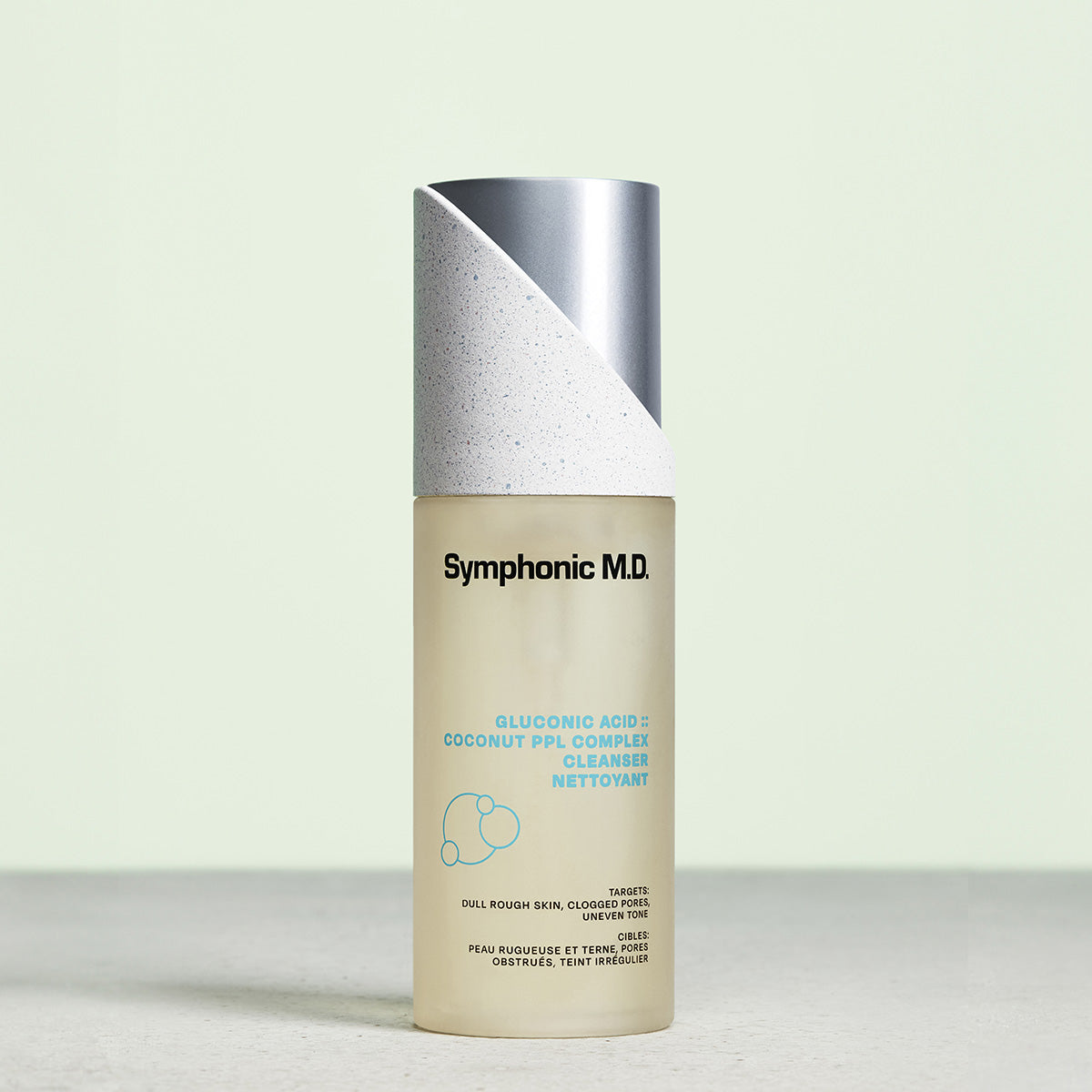
Gluconic Acid :: Coconut PPL Complex
Avoid harsh ingredients
We’ve already mentioned how harsh ingredients can be bad news for the skin. This applies to your facial cleanser too. Avoid any cleansers with ingredients such as alcohol, fragrances, sulfates, or excessive exfoliants as they tend to strip the skin’s natural oils and make acne worse.
Look for acne-fighting ingredients
While gentle face washes and those without harsh ingredients are favored, you should also look for cleansers that include acne-fighting ingredients. Shop for cleansers that include glycolic acid or benzoyl peroxide as these can both help to combat acne. However, as active ingredients, you may experience some dryness or irritation, particularly if you’re using them in addition to other acne treatments.
Cleanse twice a day
Cleansing your face twice per day can help to combat acne and ensure your skin stays clear from breakouts. You should aim to cleanse once in the morning before adding your regular skin care products, and again in the evening to remove any makeup before adding your night products. Be careful not to over-cleanse your face as this can be counterproductive and do more damage to the skin barrier.
Use a soft cloth or hands
Apply your cleanser or face wash of choice using your hands or a gentle and soft washcloth. It’s important that you steer clear of scrubbing the skin using abrasive tools, cloths, or products that can aggravate acne.
Use lukewarm water
When washing your face and removing the leftover cleanser, it’s important to use lukewarm water. Water that is too hot can dry out the skin and can also cause irritation.
Gently pat dry
Once you’ve cleansed your face, you should pat dry with a clean and soft towel. This is important as rubbing your face or aggressively drying it can damage the skin and irritate acne-prone areas.
Moisturize
Everyone should be using a moisturizer on their face, especially if you have acne-prone skin. Choosing a lightweight, non-comedogenic moisturizer can help to maintain good hydration in the skin without clogging pores and further aggravating your acne.

Our Retinol :: Vitamin C moisturizer is a great option for blemish-prone skin. It’s been specially formulated to help clear bacteria, reduce blemishes, and smooth the skin’s tone and texture. It also contains soothing agents to help calm irritation and rehydrate the skin while keeping the pores clear.
This anti-inflammatory serum powered by BioA3 targets blemishes, tone, and texture — helping to clear bacteria and smooth skin without clogging pores.
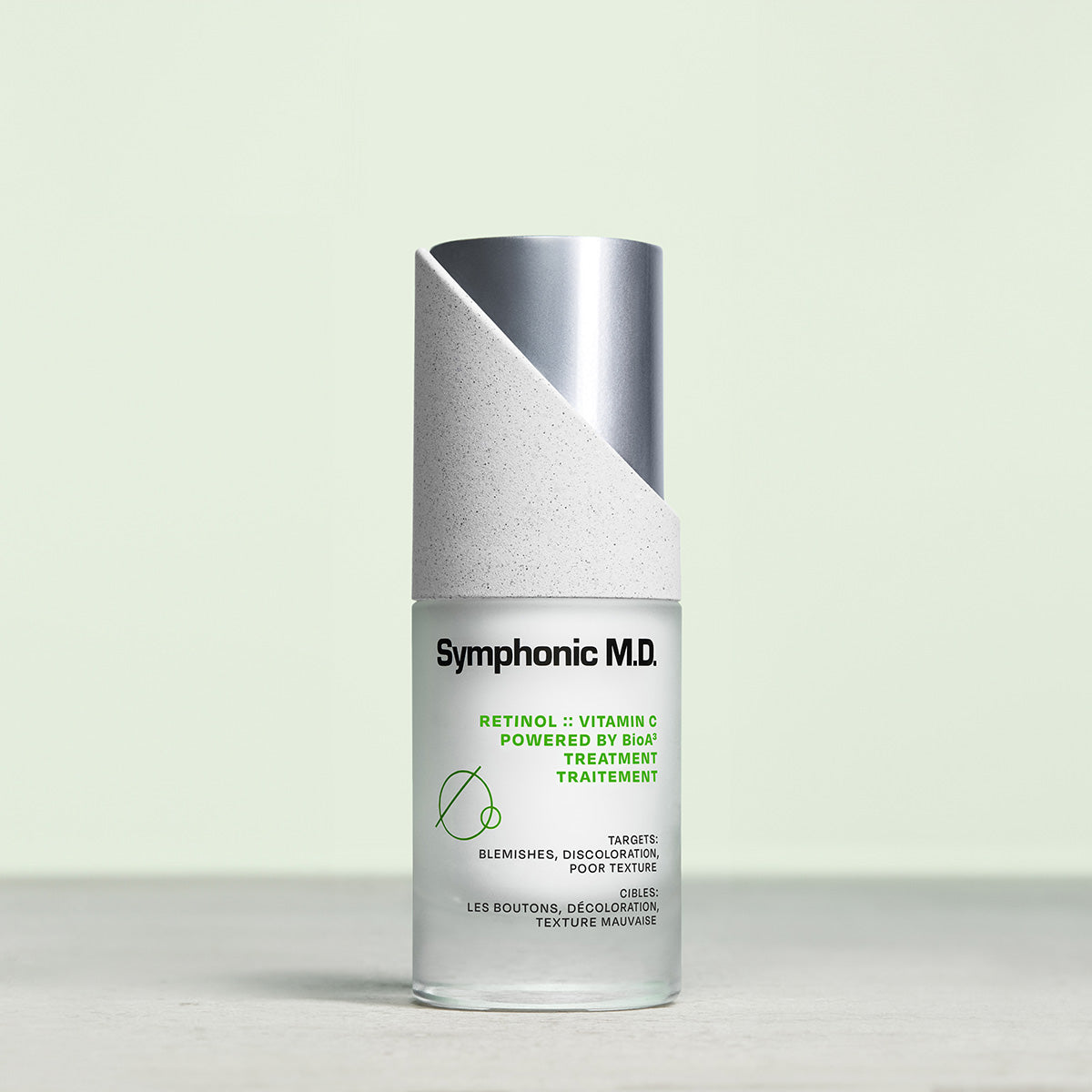
Retinol :: Vitamin C
Be consistent
Preventing breakouts is only possible when you have a consistent skincare routine. Be sure to stick with your cleansing routine and give your skincare products plenty of time to work their magic. You must avoid switching your products too much too, as this can disrupt your skin’s balance and cause more frequent breakouts as new ingredients are introduced to the skin.
Patch test new products
Before you start using a new facial cleanser, you should complete a patch test to check for any adverse reactions. This is especially important if you have sensitive or acne-prone skin.
Thinking about switching from a face wash to a facial cleanser? Learn more about using a cleanser for cleaning your skin and which type of cleanser might be most suitable for your skin type in our comprehensive guide What is a Cleanser & What Does a Cleanser Do for Your Skin?
Cleansing ingredients that can prevent and manage acne
We’ve briefly noted how certain ingredients in face washes are better for acne-prone skin than others. When choosing a cleanser for your face, whether you have acne or you’re seeking a preventative measure, you need to look for ingredients that are known to be effective in addressing acne-related issues. Here are some key ingredients to consider.
Glycolic acid
Glycolic acid is a type of alpha-hydroxy acid (AHA) that works to gently exfoliate the skin and promote cell turnover. Doing so prevents pores from clogging and therefore helps to prevent acne breakouts.
Vitamin C
As acne is related to inflammation, using an anti-inflammatory ingredient like vitamin C can help to calm acne-prone skin. When used in a face wash, you can effectively target acne-prone areas, redness, and irritation, helping to even out your skin tone and reduce acne inflammation or new acne breakouts.
Salicylic acid
Another gentle exfoliant that can help to manage and prevent acne in your facial cleanser is beta-hydroxy acid (BHA), salicylic acid. Similar to AHAs, salicylic acid exfoliates the skin to unclog the pores and reduce acne breakouts. It’s particularly effective for blackheads and whiteheads.
Benzoyl peroxide
Facial washes with benzoyl peroxide can kill acne-causing bacteria and therefore prevent breakouts due to its antibacterial properties. To avoid excessive dryness and irritation, opt for facial cleansers with lower concentrations of benzoyl peroxide to start with.
Hyaluronic acid
Keeping the skin hydrated is important in the prevention and management of acne, which makes hyaluronic acid an essential ingredient in your skincare routine. Hyaluronic acid hydrates the skin without clogging the pores.
Niacinamide (vitamin B3)
Acne also comes with inflammation and redness, so using products that have anti-inflammatory properties can really help. Niacinamide is an anti-inflammatory and also helps to regulate oil production, resulting in less risk of acne breakouts and improved skin texture for those with acne.
Tea tree oil
The antimicrobial properties in tea tree oil are invaluable in preventing and managing acne-prone skin, helping to kill acne-causing bacteria. If using separately from a face wash, be sure you dilute tea tree oil before using it to avoid any skin irritation or adverse reaction.
Clay
Using products that contain clay can help with acne as it helps to absorb excess oil from the skin. This means your pores are less likely to become clogged and cause acne due to additional sebum on the skin.
Zinc
Another ingredient with anti-inflammatory properties that can help to calm inflamed or irritated skin is zinc. Facial cleansers containing zinc can also help to promote healing of the skin while regulating sebum production.
Lactic acid
Facial washes with lactic acid can be beneficial in unclogging pores and promoting cell turnover in those with acne-prone skin. This acid is another type of AHA, with a gentle exfoliating nature that helps to improve the texture of the skin.
Green tea extract
Green tea is not only a superfood in your diet, cleansing products containing this ingredient can help in the management and prevention of acne. Green tea extract is an antioxidant which means it can help to reduce inflammation and soothe the skin. It also has potential antimicrobial properties.
Licorice extract
A face wash with licorice extract can help with inflammation and redness caused by acne due to the anti-inflammatory properties it possesses. Licorice extract may also help to lighten any hyperpigmentation caused by severe acne.

Other reasons why your skin might be breaking out
While your face wash could be the source of the problem when it comes to acne breakouts, it might not be the only reason your acne has flared up. Several other factors should be taken into consideration when trying to establish what is causing or making acne worse, including the following:
- Hormonal changes like pregnancy, menstruation, perimenopause, or hormonal conditions like polycystic ovary syndrome.
- Birth control, including progestin-only contraceptive pills.
- Medication, particularly steroids or those containing lithium.
- Diet - in some people, dairy, high-fat, and processed foods can trigger acne.
- Genetics and whether close relatives have a history of acne breakouts..
- Stress, especially when causing hormonal fluctuations and skin changes.
- Poor skincare routines where you wear lots of heavy makeup or fail to remove it properly.
- Facial shaving with old blades that can irritate and spread bacteria.
- Frequent touching or scratching of the face.
Searching for acne solutions tailored for men? Learn how acne impacts men differently and explore effective treatments in our guide: Men's Acne: Acne Treatments for Men.
How to treat acne after a breakout
While your skincare routine and choice of facial cleanser are key steps in treating, managing and preventing acne breakouts, there are also other things you could consider, including:
- Chemical exfoliants - AHAs or BHAs used in a professional chemical peel can help to remove dead skin cells and prevent clogged pores.
- Avoid touching - Acne lesions can be tempting to pick, but it’s important to avoid touching your face to prevent further irritation or potential scarring.
- Sunscreen - Protect your skin from harmful UV rays by using a broad-spectrum sunscreen with SPF 30 or higher. This is particularly important if you’re using acne medication as some medicines can make the skin more sensitive to UV light.
- Diet - Opting for a well-balanced diet can help with acne, with many studies suggesting a link between poor diets and increased acne.
- Clean hair - Oily hair can contribute to acne on the forehead and jawline, so be sure to keep your hair clean and away from your face.
- Reduce stress - As a key contributor to hormonal changes and acne, it’s important to manage stress by practicing stress-reducing activities such as exercise, yoga, meditation, or deep breathing.
- Prescription medications - If over-the-counter treatments are ineffective, or your face wash and skincare routine aren’t doing enough for your acne, a dermatologist might prescribe acne medications. These could include oral antibiotics, oral contraceptives, or prescription-strength topical treatments.
- Professional treatment - There are a wealth of technologies and professional treatments that can help with acne. Speak to a dermatologist about chemical peels, laser treatments, light therapies, microdermabrasion, cortisone injections, or professional extractions to help with your acne management.

Bottom line
While facial washes and cleansers aren’t the sole cause of acne for most people, they do have a role to play. It’s therefore essential that you do your research when it comes to choosing the right face wash for your skin. Be aware of the ingredients you’re using and any new ones you’re adding to your skincare routine to ensure they work for you. If you think your current cleanser could be contributing to your acne, consider switching to a gentler face wash with non-comedogenic ingredients.
By being mindful of what ingredients you’re putting on your skin and opting for products designed to manage or prevent acne, you can start your journey to clearer, healthier skin. But be consistent too, and really take pride in your skincare routine to get the best results.
If you’re looking for a new cleanser to try, it could be worth considering our Gluconic Acid :: Coconut PPL Complex Cleanser. This calming antimicrobial formula has been designed to target dull skin, clogged pores, and uneven skin tone. It gently sheds skin cells while stimulating the skin’s barrier repair to leave skin soft and purified.
FAQs
How long does purging skin last?
Skin purging can last from a couple of days to a few weeks, but it is a personal experience for everyone. Some people will experience a longer purging process, while for others it will be over quickly. Once purging has removed the built-up impurities in the skin, it will start to look and feel better.
How do you know if a product is purging or breaking out?
Establishing whether a product is purging or causing your skin to break out can be done by taking a break from the product. Products that cause skin purging will clear up in their own time, while those that cause breakouts will continue to cause acne until they are no longer used.
To determine what your product is doing, stop using it for a week or so to see whether your skin clears up. If it does, it’s likely the product was causing the acne and it’s not a result of purging.
Why shouldn’t you wash your face too much?
It’s important you don’t wash your face too frequently as this can strip the skin or its natural oils, causing dryness and irritation. Washing your face too much can also cause excess oil production which could lead to further acne and skin problems.
How often should you wash your face?
We recommend you wash your face no more than twice per day, once in the morning and again in the evening. However, if you have worked out or are sweating more than usual, you may need to wash your face more often.
Why does my face break out after showering?
Acne breakouts after showering could be caused by using harsh wash products, allergic reactions in your products or even using water that is too hot and therefore is drying the skin out. If you can’t pinpoint the cause, you could consider changing to a more gentle soap or shampoo to see if this makes a difference.
